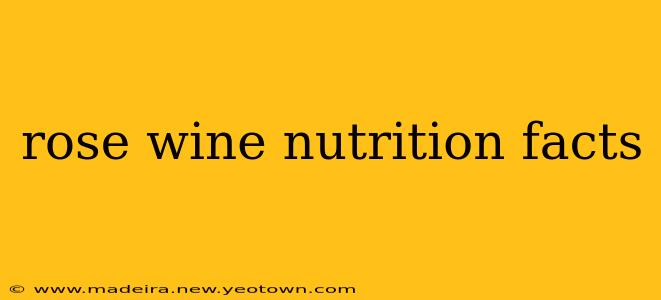Ah, rosé. The delightful pink hue, the refreshing taste – it's no wonder this wine has captured hearts (and palates) worldwide. But beyond the enjoyment, many wine enthusiasts are curious about the nutritional aspects of their favorite beverage. Let's delve into the world of rosé wine nutrition facts, exploring its calorie count, potential health benefits, and some things to keep in mind.
How Many Calories Are in a Glass of Rosé?
The calorie count in a glass of rosé varies considerably depending on several factors, primarily the type of grape, the sweetness level, and the serving size. A standard 5-ounce glass of dry rosé typically contains around 125-130 calories. However, sweeter rosés can pack more calories, potentially reaching up to 150 calories or more per glass. Remember, that's just one glass; keep mindful consumption in check!
What are the Nutritional Components of Rosé Wine?
Rosé, like other wines, isn't just calories. It contains small amounts of various substances, some of which have been associated with potential health benefits (we’ll explore these later!). Here are some key components you'll find:
- Water: The major component of rosé, accounting for the vast majority of its composition.
- Alcohol: This is a significant contributor to the calories.
- Sugars: The amount varies significantly, depending on the sweetness of the rosé. Dry rosés have minimal residual sugar.
- Acids: Naturally occurring acids like tartaric and malic acid contribute to rosé's refreshing tartness.
- Polyphenols: These are antioxidants found in grape skins, seeds, and stems. Rosé production often involves less skin contact than red wine, resulting in a lower polyphenol content compared to its red counterparts. However, it still contains a respectable amount of these beneficial compounds.
- Minerals: Traces of minerals such as potassium and magnesium are also present.
Does Rosé Wine Have Any Health Benefits?
While moderate alcohol consumption is associated with some potential health benefits, it’s crucial to approach these claims with caution. Many are correlated, not causative. The research is ongoing and complex. However, some studies suggest that moderate rosé consumption might be linked to:
- Improved Cardiovascular Health: Some studies suggest a link between moderate alcohol consumption and reduced risk of heart disease, partly attributed to polyphenols' antioxidant properties. Again, this is a complex issue with numerous other factors at play.
- Antioxidant Effects: The polyphenols in rosé possess antioxidant properties that could potentially contribute to overall well-being. Remember, this is not a replacement for a balanced diet rich in fruits and vegetables.
Is Rosé Wine Good for Weight Loss?
No. The caloric content of rosé, even in moderate servings, contributes to overall daily calorie intake. It’s not a weight-loss beverage and shouldn’t be considered as such. A healthy diet and regular exercise are far more effective for weight management.
Is Rosé Wine Gluten-Free?
Yes, naturally produced rosé wine is gluten-free. However, always check the label to ensure no gluten-containing additives have been used during processing. This is especially pertinent for rosés with added flavorings or preservatives.
How Does Rosé Compare Nutritionally to Red and White Wine?
Compared to red wine, rosé generally has a lower polyphenol content due to less skin contact during production. Compared to white wine, it often has a slightly higher calorie count because of the color production process which can add residual sugar. Each type offers a unique nutritional profile.
Conclusion: Enjoy Rosé Responsibly
Rosé wine offers a refreshing and enjoyable beverage experience. While it contains certain nutrients and some studies suggest potential health benefits associated with moderate consumption, it's essential to remember that moderation is key. Excessive alcohol consumption can lead to various health problems. Enjoy rosé responsibly, as part of a balanced diet and healthy lifestyle. Always consult with a healthcare professional or registered dietitian for personalized dietary advice.

